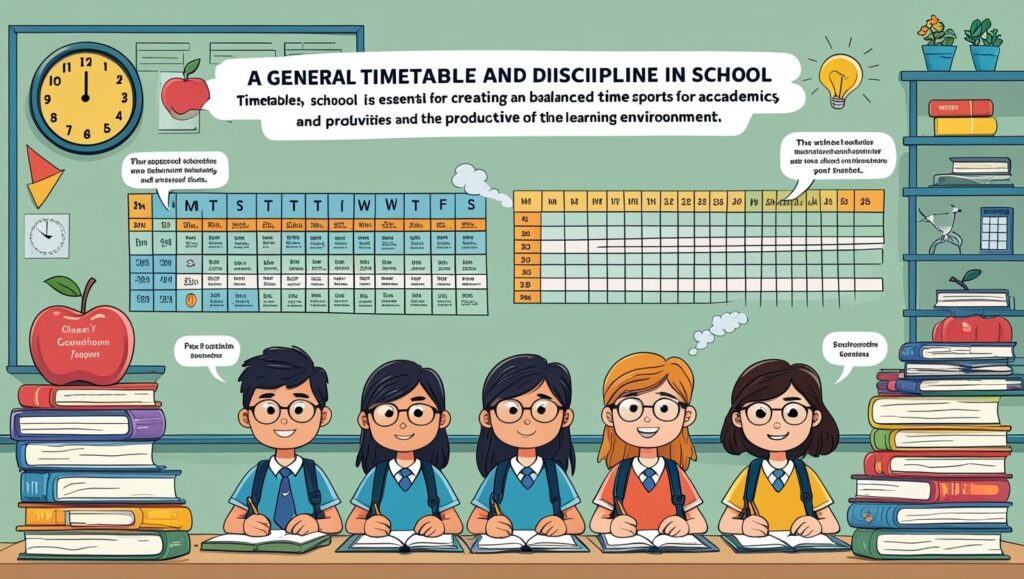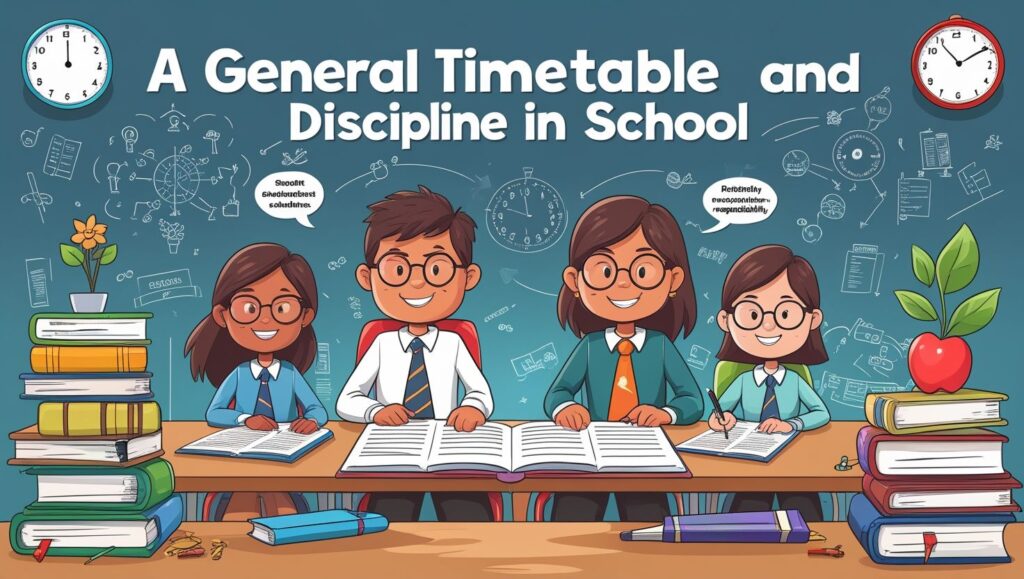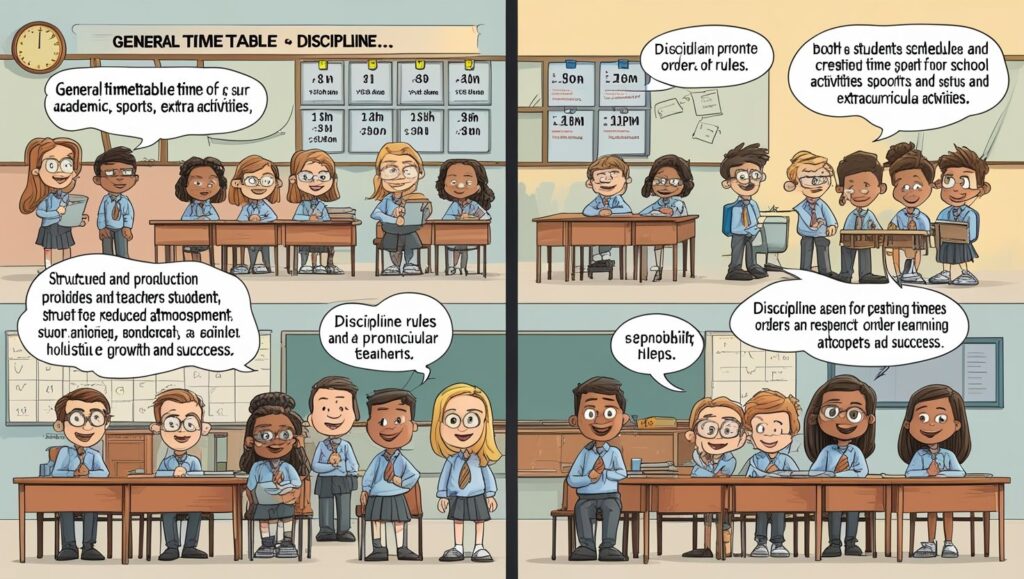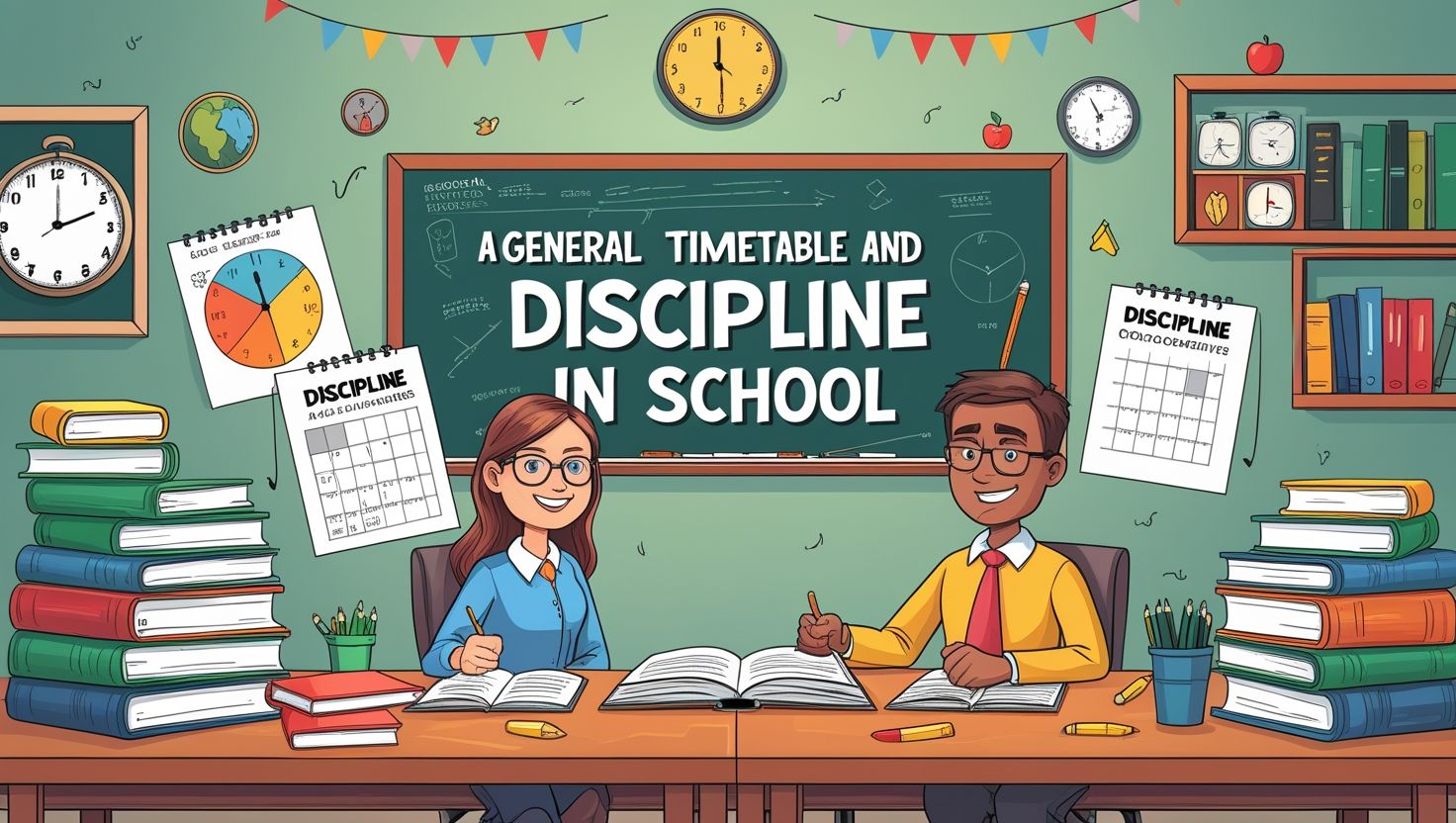Introduction
General Timetable and Discipline in School, Schools are vital institutions that nurture young minds and prepare them for the future. A school environment needs order, consistency, and discipline to function effectively. The general timetable and discipline policies are two pillars that uphold this environment. A timetable is not only a schedule of subjects and activities but also a structured framework that provides direction. On the other hand, discipline ensures that this structure is respected and followed. Both are interdependent, as a timetable without discipline becomes ineffective, and discipline without a proper timetable lacks purpose. Therefore, establishing balance between the two is essential.
Moreover, schools need to provide flexibility alongside structure so that students do not feel pressured. A well-organized timetable helps students manage time effectively and enhances productivity. Similarly, discipline cultivates respect, responsibility, and a sense of accountability. Together, these elements prepare learners for challenges of real life. In this article, we will explore the importance of a general timetable, the need for discipline, their interconnectedness, and practical ways schools can adopt them.
Importance of a General Timetable
A general timetable in school plays a crucial role in organizing learning activities. It is essentially a roadmap that guides both teachers and students throughout the day. With a timetable in place, every subject receives appropriate time, preventing imbalance and neglect. Furthermore, it ensures that physical activities, arts, and extracurricular tasks also find space, promoting holistic development. Additionally, timetables bring order to school life, avoiding confusion and chaos. Teachers are able to plan their lessons better, while students develop habits of punctuality and routine.
In fact, it creates a rhythm where each part of the day has a clear purpose. For students, this routine provides security, as they know what to expect next. Moreover, timetables reduce wastage of time, since transitions between classes become smoother. They also help in distributing workload evenly, avoiding unnecessary stress. When properly designed, a timetable balances academics with play, creativity, and rest. Therefore, it not only contributes to academic growth but also emotional and social well-being. Hence, the importance of a timetable cannot be underestimated in the learning process.

Role of Discipline in School
Discipline is a fundamental value that underpins the functioning of every school. It refers to the practice of training students to follow rules, respect authority, and maintain self-control. Without discipline, the most carefully prepared timetable would lose its meaning. Discipline teaches students how to act responsibly and develop good character. It instills respect for teachers, peers, and the learning environment. Moreover, it enhances focus and concentration, allowing students to pay full attention in class. With discipline, classrooms become spaces of productivity rather than disruption. Teachers can deliver lessons effectively, and students learn more efficiently.
Discipline also includes punctuality, neatness, and accountability, which are life-long values. Importantly, discipline is not limited to punishment; it is more about positive reinforcement and guidance. Schools should emphasize discipline through encouragement, appreciation, and role modeling. Furthermore, it helps prevent conflicts and fosters a sense of cooperation. Students who practice discipline are better prepared to handle challenges beyond school life. Hence, discipline is the backbone that holds the structure of education firm and steady.
Connection between Timetable and Discipline
The timetable and discipline in school are closely interlinked, forming two sides of the same coin. A timetable sets the framework for daily activities, while discipline ensures that framework is followed consistently. Without discipline, the timetable is nothing more than a piece of paper. Students may arrive late, skip tasks, or misuse free time. Conversely, enforcing discipline without a timetable can create rigidity and confusion. When combined, they provide balance, direction, and order.
For instance, if the timetable schedules mathematics in the first period, discipline ensures students are present and attentive at that time. Similarly, if there is time set aside for physical education, discipline ensures that students respect that schedule and participate actively. Teachers also benefit, as discipline helps them maintain flow according to the timetable. This connection reflects how structure and behavior complement each other. Additionally, both create an environment of fairness, since every subject and activity receives its due importance. Therefore, timetable and discipline cannot exist effectively in isolation; they must work hand in hand to shape a productive school atmosphere.
Benefits for Students
Students are the primary beneficiaries of a well-planned timetable and disciplined school life. A timetable provides clarity on what to study and when, reducing stress and uncertainty. It helps students distribute their time evenly between academics, sports, and co-curricular activities. Additionally, it prevents overload by spreading subjects across the week in manageable portions. On the other hand, discipline teaches responsibility and time management. When students learn to follow schedules strictly, they develop habits of punctuality and self-control. These habits later translate into success in higher education and careers.
Moreover, discipline creates a positive classroom culture where learning is respected. Students waste less time and gain more knowledge. It also helps in shaping social skills, since respecting rules often means respecting others. Together, timetable and discipline reduce anxiety, improve focus, and enhance academic performance. Furthermore, they promote healthy routines, including adequate breaks for rest and play. Ultimately, they prepare students not only to excel in studies but also to face real-life challenges with resilience and confidence.

Benefits for Teachers
Teachers also experience significant advantages when a general timetable and discipline are properly enforced. A timetable helps them plan lessons in advance, distribute syllabus evenly, and avoid unnecessary rush. It also ensures that each subject is given fair attention, preventing neglect. Teachers can manage their workload better and feel less stressed when the schedule is predictable. Discipline further strengthens their teaching process. In a disciplined classroom, teachers spend less time managing behavior and more time on effective instruction. It allows them to maintain authority and create an environment of mutual respect. Moreover, disciplined students are more attentive, which enhances the quality of interaction. Teachers also gain confidence when they know their lessons will be conducted on time and without interruption.
This improves professional satisfaction and reduces burnout. Furthermore, discipline fosters cooperation between teachers and students, building stronger relationships. Timetable and discipline together help teachers strike a balance between academic demands and extracurricular responsibilities. In short, both contribute to efficient teaching and make the profession more rewarding.
Challenges in Maintaining Timetable and Discipline
Despite their importance, maintaining an effective timetable and discipline in schools is not without challenges. One common issue is overcrowded classrooms, which make it difficult to follow schedules strictly. Similarly, unexpected events such as examinations, functions, or holidays often disrupt the timetable. Teachers may struggle to complete the syllabus within the limited time frame. On the discipline side, students sometimes resist rules, leading to conflicts and distractions. Peer pressure, lack of parental support, or exposure to digital distractions can weaken discipline. Moreover, overemphasis on strictness may create stress and anxiety, affecting learning outcomes. Teachers themselves face challenges in managing both discipline and academic responsibilities simultaneously.
Inconsistent policies or lack of clear communication from school administration can also cause confusion. Furthermore, cultural differences and individual learning needs may require flexibility, making rigid discipline and timetables less effective. Therefore, schools must find a balance by being firm yet adaptable. Addressing these challenges requires teamwork among administrators, teachers, parents, and students. Only then can timetable and discipline serve their true purpose effectively.

Strategies for Improvement
Improving timetable and discipline requires thoughtful strategies and collective effort. Firstly, schools should design timetables that balance academic and non-academic activities, ensuring overall development. Breaks and rest periods should also be included to prevent fatigue. Secondly, discipline policies should focus on encouragement rather than punishment. Positive reinforcement, recognition, and counseling can help students stay motivated. Furthermore, involving teachers in timetable planning ensures practicality and fairness. Parents should also be engaged in promoting discipline at home, reinforcing values taught at school.
Technology can be used to manage timetables digitally, making communication easier. For discipline, workshops, awareness campaigns, and extracurricular activities can foster self-control and responsibility. Schools should also train teachers in classroom management techniques to handle disruptions effectively. Importantly, flexibility must be built into the system to handle unexpected changes without stress. Regular evaluation of timetables and discipline policies ensures continuous improvement. With such strategies, schools can create a productive, positive, and nurturing environment where both students and teachers thrive.
Conclusion
The general timetable and discipline in schools are essential components that ensure smooth functioning and quality education. The timetable organizes daily activities, giving equal importance to different subjects and tasks. Discipline, on the other hand, provides the foundation for following that structure with respect and responsibility. Together, they create an atmosphere where teaching and learning flourish. While challenges may arise, effective planning and positive reinforcement can overcome them. Students benefit by learning time management, responsibility, and focus.
Teachers also gain by working in an organized and respectful environment. Furthermore, these practices instill lifelong values in students, preparing them for future academic and professional endeavors. Schools must therefore prioritize a balanced timetable and supportive discipline policies. By doing so, they not only ensure academic excellence but also promote character building, cooperation, and holistic development. Ultimately, the harmony of timetable and discipline reflects the true spirit of education, guiding learners toward becoming responsible and capable citizens.

What i do not realize is if truth be told how you’re not really a lot more
smartly-favored than you may bbe now. You’re so intelligent.
You already know thus considerably in terms of this subject,
made me for my pwrt believe it from a lot of various angles.
Its like men andd women are not fascinated unless it is onne thing
to accomplish with Girl gaga! Your personal stuffs
nice. At all times maintain it up! https://fortune-glassi.Mystrikingly.com/